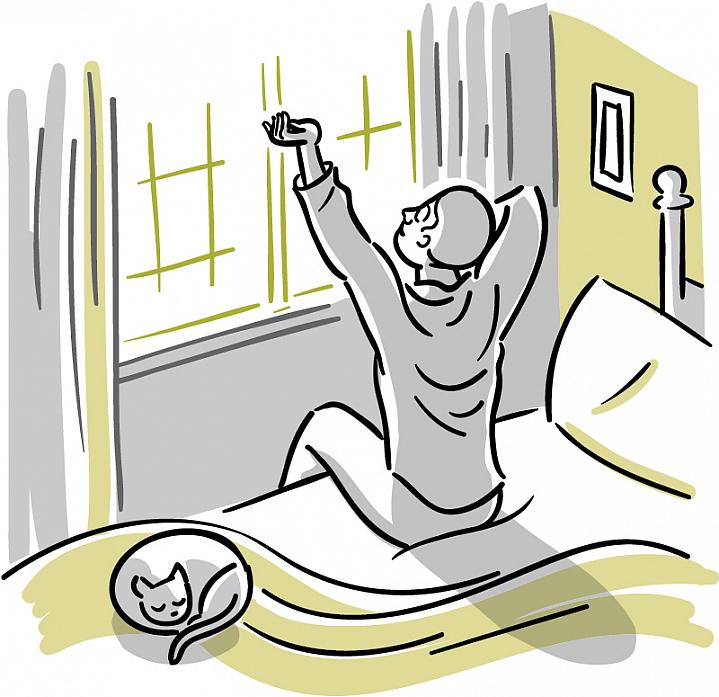Sleep – A key element of our well-being
SLEEP : A KEY ELEMENT OF OUR WELL-BEING
Sleep forms a very natural part of our daily habits and as such, we do not pay much attention to it. However, according to fitness experts and lifestyle gurus, sleep plays a very vital part in our well-being. It is a condition of body and mind that typically recurs for several hours every night . Which the nervous system is relatively inactive, the eyes closed, the postural muscles relaxed and conscience practically suspended.
To put it more accurately, sleep is a natural recurring state of mind and body . Characterised by altered consciousness, relatively inhibited sensory activity, reduced muscle activity and reduced interactions with surroundings. Sleep occurs in repeating periods, in which the body alternates between two distinct modes . REM sleep and non-REM sleep, where REM stands for rapid eye movement. The need for sleep varies among individuals according to their respective age. However, sleep is considered to be adequate when there is no noticeable daytime sleepiness or dysfunction . Researchers have found that sleeping 6-7 hours each night corroborates to longevity and cardiac health in adult humans . Though there are many other underlying factors involved.
SOME MORE “SLEEP”Y FACTS :
Sleep recharges the brain, thus allowing it to learn and make memories. Insufficient sleep is linked to car crashes, poor work performance and problems with moods and relationships. The most pronounced physiological changes in sleep occur in the brain. The two stages of sleep, REM and Non-REM are so different that physiologists identify them as distinct behavioural states.
The sleep cycle of alternate NREM and REM sleep takes an average of 90 minutes . It occurs 4-6 times in a good night’s sleep. REM sleep is closer to wakefulness and is characterised by rapid eye movement and muscle atonia. NREM is considered to be deep sleep . The deepest part is called slow wave sleep ) and is characterised by lack of prominent eye movement and muscle paralysis. As humans fall asleep, body activity slows down. Body temperature, heart rate, breathing rate and energy use all decrease. Especially, during non-REM sleep, the brain uses significantly less energy during sleep than it does in waking. SLEEP : A KEY ELEMENT OF OUR WELL-BEING
BENEFITS OF SLEEP :
According to some sleep experts, ” sleep affects almost every tissue in our bodies “. It affects growth and stress hormone, our immune system, appetite, breathing, blood pressure and cardiovascular health. Some of the benefits of sleep include –
• Firstly , Proper sleep helps to keep the bodyweight in check. Short sleep duration is associated with an incredible risk of weight gain and obesity in both children and adults. In fact, good sleepers also tend to eat fewer calories.
• Secondly , Good sleep can improve concentration and productivity.In addition , it maximises problem-solving skills and enhance memory.
• Thirdly , A quality sleep of 7-8 hours per night reduces the chances of heart disease. Sleeping less than 7/8 hours per night is linked to an increased risk of heart disease and stroke.
• Fourthly , A good sleeping habit reduces the risk of diabetes. Many studies show a strong link between short sleep duration and Type 2 diabetes.
•Fifthly , A proper mental health is also related to a good night’s sleep.
• Above all ,Sleep improves the immune function. Getting at least 8 hours of sleep can improve your immune function and help fight several ailments.
Conclusion
Anxious thoughts and rumination can also keep you awake, of course. If you tend to wake up in the middle of the night and a racing mind won’t let you get back to sleep, it may mean that something is bothering you more than you’d care to otherwise admit or address, Dr. Breus says. “It’s generally a sign that something stressful is going on in life.”
Sufficient sleep is essential for optimum health—just a few of the numerous processes occurring during sleep include memory consolidation, clearance of brain metabolites, and restoration of nervous, immune, skeletal, and muscular systems.
It is well-known that certain substances, such as caffeine, can affect the onset of sleep in a negative way. On the other hand, evidence is growing that shows how other foods like tart cherries, kiwi, fatty fish (like salmon and tuna), and malted milk may have beneficial effects on sleep.
The bottom line is, if you’re not getting the recommended seven to eight hours of sleep per night, you need to rethink your schedule so you can make sure you do — and then you have to figure out how to fit in your regular workouts without sacrificing that sleep. You can’t have one without the other; both are absolutely essential to you being able to operate at 100 percent — not just in the gym, but in your everyday life, too.





[…] https://kolahal.org/2021/06/02/sleep-a-key-element-of-our-well-being/ […]
[…] https://kolahal.org/2021/06/02/sleep-a-key-element-of-our-well-being/ […]
[…] https://kolahal.org/2021/06/02/sleep-a-key-element-of-our-well-being/ […]
Good job on this post! It’s insightful.
Welcome #My best site:
http://www.autogenmotors.com/bbs/board.php?bo_table=free&wr_id=1721592
http://potolki-mitishi.ru/index.php?subaction=userinfo&user=ekesewo
http://goddessxuan2.com/home.php?mod=space&uid=467094
http://gto43.com/home.php?mod=space&uid=166879
http://worldhist.ru/club/user/29860/